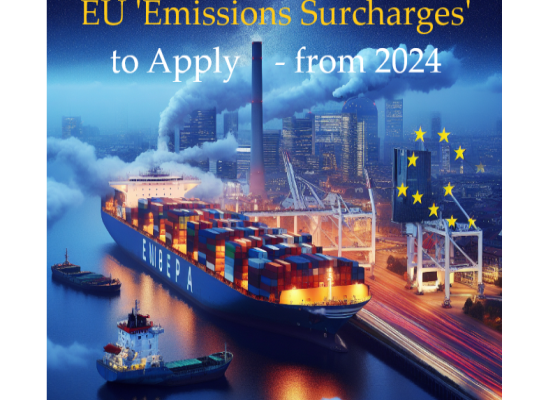The shipping industry is being integrated into the EU Emission Trading System (ETS).
As of 01 January 2024, new carbon taxes will impact all shipping customers involved in transporting goods to, from, and within the European Economic Area (EEA), which consists of EU member states, as well as Iceland, Liechtenstein, and Norway.
Ocean carriers across the industry have announced the implementation of an ETS surcharge to cover the costs of the CO2 charge of shipping in the EU. In other words, the shipping lines will simply pass these new costs onto to the shipper.
We have already received notifications from the largest containership operators – CMA CGM and Maersk – that new surcharges will apply. Part of the release from Maersk says:
“EU ETS introduces carbon pricing for shipping from 2024. The cost of compliance is expected to significant and will keep increasing with the phased implementation. It will be passed on in the form of a standalone surcharge known as ‘Emissions Surcharge’ applied to all bookings on the voyage that will be subject to the EU ETS.”
Carbon pricing within the EU is calculated based on vessels rather than cargo. As a result, ship operators must report their emissions and allocate allowances for each ton of CO2 they generate.
For FCL cargo the surcharge billed to the customer will be a flat fee per container.
For LCL this likely to be a weighted average amount per cubic metre or per bill of lading.
These carbon taxes extend beyond the EU, meaning that half of the emissions will be subject to the new charges if a vessel travels between the EU and a non-EU country.
The system covers:
- 50% of emissions from voyages starting or ending outside of the EU (allowing the third country to decide on appropriate action for the remaining share of emissions);
- 100% of emissions that occur between two EU ports and when ships are within EU ports.
The EU ETS covers CO2 (carbon dioxide), CH4 (methane) and N2O (nitrous oxide) emissions, but the two latter only as from 2026.
In justifying the scheme, the European Commission has written:
“While maritime transport plays an essential role in the EU economy and is one of the most energy-efficient modes of transport, it is also a large and growing source of greenhouse gas emissions. In 2018, global shipping emissions represented 1,076 million tonnes of CO2, and were responsible for around 2.9% of global emissions caused by human activities.”
For more on the background of controlling Green House Gas (GHG) emissions form cargo vessels, read our article from July: The IMO Summit: Outcomes for Shipping.
For more information about international shipping – be it regarding ‘Emissions Surcharges,’ or any other aspect – contact us here at Colless Young. As licensed Customs Brokers and Freight Forwarders we offer correct, professional advice on all your import and export transactions. We are based in Brisbane and provide a complete range of logistics services, for both sea cargo and airfreight, through all Australian ports and airports.

